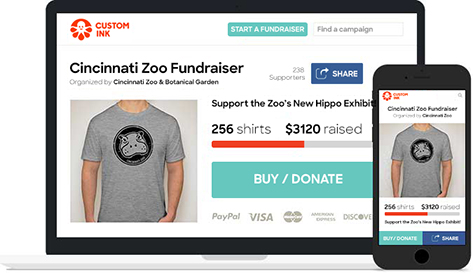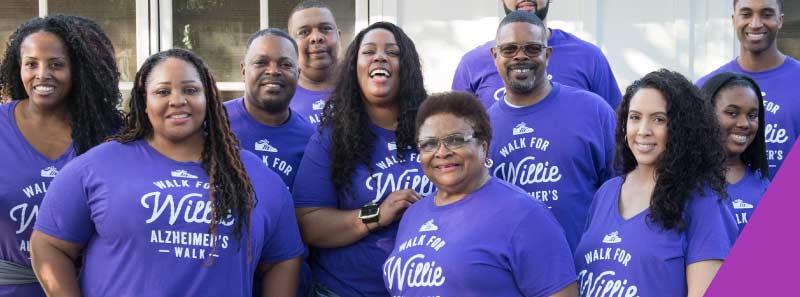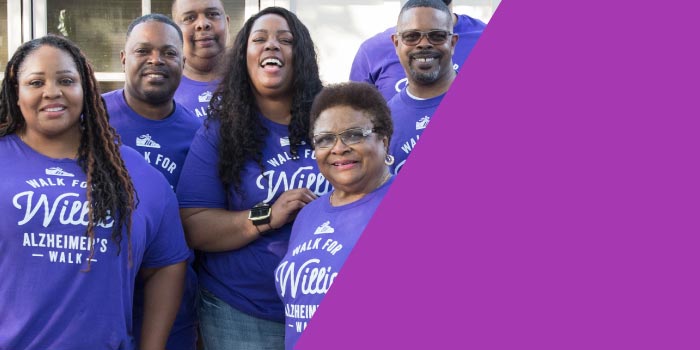Sell Custom T-shirts. Collect Donations. Easy.
Custom Ink Fundraising makes raising funds and awareness risk-free.
Engage your community with custom t-shirts and more

Engage your community with custom t-shirts and more
Sell custom t-shirts and take donations with no inventory, hassles or risk. Just design your shirt, share why you are raising and then share your campaign. We fill the orders and send along the funds you raise! Custom Ink Fundraising is a great tool for any group, cause or community.
-
 1
1
Design your shirt
-
 2
2
Tell your story
-
 3
3
Track your progress
 4
4
Easy fulfillment
-
 Simple and easyLane Elementary
Simple and easyLane ElementaryOur T-shirt campaign was great! All orders were placed online by each individual so we did not have to order inventory in advance. The t-shirts were delivered to our school, ready for distribution to our students. I can't wait to do it again!
Sharon Sussin, President Lane Elementary
- 54 days
- 126 shirts sold
- $1,796 funds raised
-
 Additional donationsTeam Nat
Additional donationsTeam NatThe whole experience of running a Custom Ink fundraiser exceeded my expectations. This is such a valuable platform, because it takes a lot of stress away from fundraising. Through my Custom Ink fundraiser, we raised 4 times what we thought we would raise!
Celeste Homan, Organizer Team Nat
- 26 days
- 255 shirts sold
- $4,257 funds raised
-
 Great customer careSupport Bill Sager
Great customer careSupport Bill SagerWe set a small goal of, 'OK, let's try to sell 100 shirts.' Then, we realized, shortly after it went live, that it was going to turn into something way bigger. Ultimately we raised more than $9,000 and sold over 600 shirts to family, friends, and even complete strangers - including a few stationed in Afghanistan.
Tony Re, Organizer Support Bill Sager
- 13 days
- 603 shirts sold
- $9,152 funds raised
-
 No Upfront CostBig Fluffy Dog Rescue
No Upfront CostBig Fluffy Dog RescueHaving to preorder t-shirts without knowing what people need and fronting that cost and taking orders and shipping them all out individually is impossible for us, but possible through the Custom Ink Fundraising tool.
Jillian Kaplan, Fundraising Chair Big Fluffy Dog Rescue
- 24 days
- 3777 shirts sold
- $117,551 funds raised
Our T-shirt campaign was great! All orders were placed online by each individual so we did not have to order inventory in advance. The t-shirts were delivered to our school, ready for distribution to our students. I can't wait to do it again!
Sharon Sussin, President Lane Elementary
- 54 days
- 126 shirts sold
- $1,796 funds raised
The whole experience of running a Custom Ink fundraiser exceeded my expectations. This is such a valuable platform, because it takes a lot of stress away from fundraising. Through my Custom Ink fundraiser, we raised 4 times what we thought we would raise!
Celeste Homan, Organizer Team Nat
- 26 days
- 255 shirts sold
- $4,257 funds raised
We set a small goal of, 'OK, let's try to sell 100 shirts.' Then, we realized, shortly after it went live, that it was going to turn into something way bigger. Ultimately we raised more than $9,000 and sold over 600 shirts to family, friends, and even complete strangers - including a few stationed in Afghanistan.
Tony Re, Organizer Support Bill Sager
- 13 days
- 603 shirts sold
- $9,152 funds raised
Having to preorder t-shirts without knowing what people need and fronting that cost and taking orders and shipping them all out individually is impossible for us, but possible through the Custom Ink Fundraising tool.
Jillian Kaplan, Fundraising Chair Big Fluffy Dog Rescue
- 24 days
- 3777 shirts sold
- $117,551 funds raised
Support a Campaign. Get Inspired.
Some of our top Custom Ink fundraisers show you what's possible
Stand with NDIA in the fight for digital equity.
Support Boston Children's Hospital!
Buy a shirt or donate to help our cause for Jaysen
Help Raise Money for Pediatric Cancer at MGH!
Purchase a shirt to support Analise!
Wear the Cause, Support Lung Health!
Smarter Fundraising for Nonprofits
Raise money and awareness for your cause. Sell custom apparel. Accept donations for free.
Learn MoreBooster is now Custom Ink! We make it easier than ever to start a t-shirt fundraiser for your charity, school, family, or any cause you support. Since you won’t need to fuss with inventory or overhead, you can focus on what matters - telling your story and raising awareness and funds in a risk-free environment. Make your own fundraiser shirts in our best-in-class online Design Lab and easily champion your cause across social media with a free, dedicated webpage. It’s that simple! Bring your cause to the surface and shed light on what matters most to you in a truly meaningful way with Custom Ink Fundraising.












